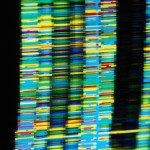Link to Pubmed [PMID] – 17579712
PLoS ONE 2007;2(6):e538
Pre-mRNA splicing is a crucial step in gene expression, and accurate recognition of splice sites is an essential part of this process. Splice sites with weak matches to the consensus sequences are common, though it is not clear how such sites are efficiently utilized. Using an in vitro splicing-complementation approach, we identified PUF60 as a factor that promotes splicing of an intron with a weak 3′ splice-site. PUF60 has homology to U2AF(65), a general splicing factor that facilitates 3′ splice-site recognition at the early stages of spliceosome assembly. We demonstrate that PUF60 can functionally substitute for U2AF(65)in vitro, but splicing is strongly stimulated by the presence of both proteins. Reduction of either PUF60 or U2AF(65) in cells alters the splicing pattern of endogenous transcripts, consistent with the idea that regulation of PUF60 and U2AF(65) levels can dictate alternative splicing patterns. Our results indicate that recognition of 3′ splice sites involves different U2AF-like molecules, and that modulation of these general splicing factors can have profound effects on splicing.

